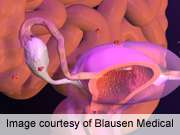For women with early-stage endometrial cancer and atypical complex hyperplasia, fertility-sparing treatment seems feasible, according to research published in the October issue of the American Journal of Obstetrics & Gynecology.
(HealthDay)—For women with early-stage endometrial cancer (EC) and atypical complex hyperplasia (ACH), fertility-sparing treatment seems feasible, according to research published in the October issue of the American Journal of Obstetrics & Gynecology.
Ioannis D. Gallos, M.D., from the Birmingham Women's Hospital in the United Kingdom, and colleagues conducted a systematic review and meta-analysis to examine the regression, relapse, and live birth rates for women with EC and ACH who underwent fertility-sparing treatment. A total of 34 observational studies, involving 408 women with EC and 151 women with ACH were included.
The researchers found that, for EC, fertility-sparing treatment achieved a pooled regression rate of 76.2 percent, a relapse rate of 40.6 percent, and a live birth rate of 28 percent. The corresponding figures for ACH were 85.6, 26, and 26.3 percent. During follow-up, 3.6 percent of women were diagnosed with ovarian cancer (concurrent or metastatic), 1.9 percent of women (10 women) progressed to disease higher than stage I EC, and two of these 10 women died.
"In conclusion, this review of observational studies found a high chance of disease regression and encouraging live birth rates of early-stage EC and ACH with fertility-sparing treatment followed by assisted reproduction," the authors write. "Our systematic examination of the published literature confirms that there is only moderate-quality observational evidence to inform clinical practice, and results should be interpreted with caution."
More information:
Abstract
Full Text (subscription or payment may be required)
Journal information: American Journal of Obstetrics and Gynecology
Copyright © 2012 HealthDay. All rights reserved.




















